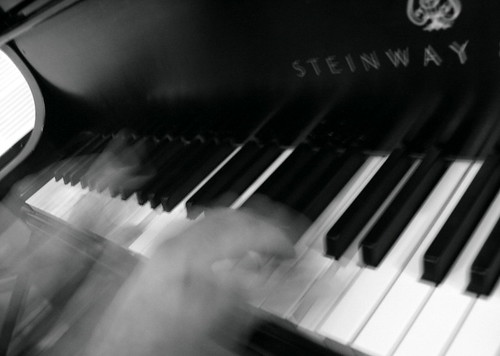In the summer of 2010, I received a mid-career leadership internship for mid-career professionals (sadly, I’m no longer an emerging artist) at
Tapestry Opera in Toronto. As I was currently in the middle of figuring out whether I wanted to be a collaborative pianist, piano teacher, blogger, or go some other direction in arts leadership, I jumped at the opportunity and showed up in early July ready to learn.
After the first few days of getting to know processes and procedures in the front office at Tapestry, Wayne Strongman, the
founder and Artistic Director at the time, took me aside for a private talk.
Wayne explained that as part of my internship that summer, he would like me to start a project. Deciding on what the project would actually be would be part of the project, as well as creating a business and implementation plan for its inclusion in the 2010-11 season.
“And by the way.” he continued.
“We have no money to spare for your project, so it will have to be self-sustaining from the start.”
Given these tricky conditions, I got to work right away.
Since I had played for countless workshops and performances over the previous 8 seasons, I had a wide knowledge of Tapestry's current repertory, as well as a slightly less than clear idea of the productions that they had mounted from the late 70’s to 2002 when I first started coaching at the company.
My idea was twofold: to start a Tapestry Songbook program that would feature arias from Tapestry’s unique repertory, as well as, through New Opera 101, giving emerging pianists and singers the opportunity to coach with experienced pianists and singers to get a feel of the lay of the land.
Because the skill set of the pianists and singers who worked for the company (including
Jennifer Tung,
Carla Huhtanen,
Alex Dobson,
Krsztina Szabó, and
Keith Klassen and myself) was unique, there was some concern that as Tapestry's performing artists became more busy in the profession and would no longer be able to devote time to do workshops and performances as they had in the past, it would be difficult to find singers and pianists that were a fit in the high stakes game of new opera. Sadly, that's exactly what happened to me, as I became busier with piano teaching, examining, curriculum development and examiner training at the RCM, so the time that I had to commit to Tapestry in subsequent years became less and less.
But getting back to the story...
The first step was to compile the entire aria and duet repertory of the company from its roots to the present day. In order to find all the relevant scores, I had to not only dig through Tapestry's office space, but catalog all the operas and opera scenes in an organized manner. So I learned how to catalog things. In order to keep an organized record of what I found, a database was needed to keep track of every aria and duet in the history of the company's commissioned works. So I learned how to compile a database.
I scheduled a two-day workshop in Tapestry's Ernest Balmer Studio the following week so I could read through
the entire commissioned repertory of the company's history. I'm glad I paid attention in Marie Rolf's Advanced Keyboard Skills classes back at Eastman - contemporary opera features a lot of difficult scores.
At the end of the process, a continuing program was created that is now an annual part of the company's concert and workshop season. Through multiple income streams (singers + pianists pay for a two-day YAP that has a paid concert at the end which donors can also sponsor), I planned on the program's need for financial independence from the start so it could be up and running from the first season.
I'm thrilled to see that the
New Opera 101/Tapestry Songbook is yet again running in February 2017, this time featuring mezzo soprano Krisztina Szabó, tenor Keith Klassen, and pianist Steven Philcox as both clinicians and performers.
The collaborative energy between clinicians and young artists is always palpable in the New Opera 101/Tapestry Songbook, and I'm glad that the next generation of artists will be able to contribute to the new opera field what we were able to contribute so many years back.
But it's important to remember that the project's lack of initial funding ended up being an advantage in the end through the act of synthesizing and reworking a new opera company's existing repertory.
-------------------------------
The reason I'm writing this story is a bit more serious. I understand that this is a difficult time for both performing artists, teachers, and arts organizations, especially with the anticipated federal arts cuts in the United States.
I regularly receive emails for help from pianists who have finished their graduate work and are absolutely unable to successfully enter
any young artist program or teaching position. There are simply too many pianists for too few positions.
I also receive calls for help from teachers from collaborative piano programs who are unable to fill their programs. There simply might be too many collaborative piano programs (especially at smaller state and private institutions) for not enough pianists who are interested in entering the field.
Nevertheless, even though the profession might have too many program openings for a body of graduates who are chasing down a shrinking number of quality positions in the field, there's another avenue open to everyone:
Start something.
In the classical music field, there's an assumption that you'll never work unless you get past the gatekeepers - unless you've graduated from the right university program with the right teacher, have gone to the right summer programs, and have made the connections with the right people.
I disagree with that line of thought. In the world of classical music, chamber music, opera, art song, piano pedagogy, and interdisciplinary performance, there's always space for new blood, new initiatives, new organizations. They just need people who are interested in breaking new ground.
And if you're the one that starts the initiative (that might just feature you as a performing artist), then it's a sure-fire way to get people to know who you are and what you do. And if you can upload the performance to social media and (even better) hire some folks along the way, you've got a great way to raise your stock value in the profession. The important thing is that you set the conditions by which your own skills and professionalism will shine through.
Start something.











